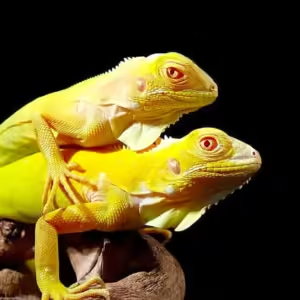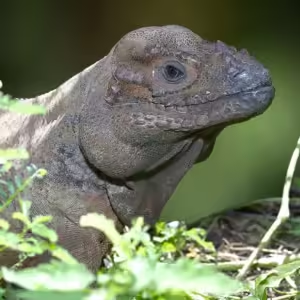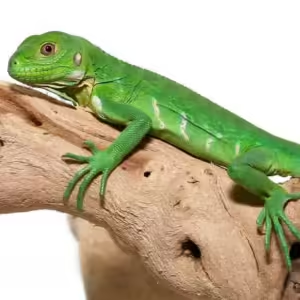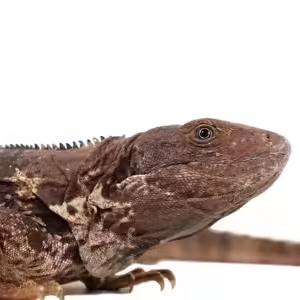Albino Iguana For Sale
$849.99
WE HAVE BABY ALBINO IGUANA FOR SALE. HERE ARE SOME HIGHLIGHTS:
- Iguana iguana
- Captive Bred Babies
- Approximately 13 – 15 Inches In Length
- These Lemonade Yellow Lizards Are Amazing And Easily Handled
- Feeding On Vegetables Such As Romaine Lettuce, Kale, And Carrots
- Originating From South Mexico To South America And The Caribbean
- Adults Will Get Up To Sizes Of 5-6 Feet In Total Length
- With Good Care And Handling These Iguanas Can Live Up To 15-20 Years
- Make Sure To Include Lots Of Branches, Foliage And A Decent Amount Of Hiding Places As Well As A Hot Humid Environment
Albino Iguanas
Albino iguanas are a rare and captivating variant of the common iguana species, distinguished primarily by their lack of pigmentation. Unlike their more commonly seen counterparts, albino iguanas exhibit a striking white or pale coloration, a direct result of their genetic mutation. This mutation inhibits the production of melanin, the pigment responsible for the typical green and brown hues seen in most iguana species. As a result, albino iguanas possess an otherworldly appearance, often featuring pink or red eyes due to the visibility of blood vessels through their translucent skin.
The uniqueness of albino iguanas extends beyond their appearance. The rarity of these reptiles in both the wild and captivity adds to their allure. In natural habitats, albino iguanas are seldom encountered due to their lack of camouflage, which makes them more vulnerable to predators. This vulnerability significantly reduces their chances of survival, thereby contributing to their scarcity. In captivity, breeding albino iguanas presents its own set of challenges. The recessive gene responsible for albinism must be present in both parent iguanas, and even then, the likelihood of producing an albino offspring is relatively low.
Despite these challenges, albino iguanas have garnered attention among reptile enthusiasts and breeders. Their ethereal appearance and unusual characteristics make them a sought-after addition to collections. However, caring for albino iguanas requires a thorough understanding of their specific needs, particularly in terms of lighting and diet, to ensure their health and well-being. Their sensitive skin is more prone to sunburn, and they may require special UVB lighting to compensate for their inability to naturally produce sufficient levels of vitamin D.
In summary, albino iguanas represent a fascinating deviation from the norm within the iguana species. Their unique lack of pigmentation, coupled with their rarity, makes them a subject of intrigue and admiration among those who study and care for reptiles. As we delve deeper into the world of albino iguanas, we uncover more about what makes these creatures so extraordinary.
Biological Characteristics
Albino iguanas exhibit a unique set of biological characteristics driven by a genetic mutation that inhibits the production of melanin, the pigment responsible for coloration in most animals. This genetic anomaly results in their distinctive appearance, characterized by a lack of pigmentation in their skin, eyes, and scales. Unlike their non-albino counterparts, albino iguanas typically display a white or pale yellow complexion, with striking red or pink eyes due to the visibility of blood vessels in the absence of melanin.
The genetic mutation leading to albinism is recessive, meaning that both parent iguanas must carry the gene for the condition to manifest in their offspring. This rarity contributes to the fascination surrounding albino iguanas, making them a subject of interest among herpetologists and animal enthusiasts alike. However, this condition is not without its challenges. The absence of melanin leaves albino iguanas with heightened sensitivity to sunlight, necessitating careful management of their exposure to ultraviolet rays to prevent skin damage and other health complications.
In addition to their distinctive appearance, albino iguanas experience differences in vision compared to non-albino iguanas. The lack of melanin in the retina affects their visual acuity and sensitivity to light. Albino iguanas often have reduced visual capabilities in bright light conditions and may be more comfortable in shaded or dimly lit environments. This sensitivity necessitates special care in their habitat setup, ensuring that they have access to shaded areas and UVB lighting that mimics their natural environment without causing harm.
Health implications associated with albinism in iguanas extend beyond sensitivity to sunlight and vision challenges. These reptiles are often more susceptible to skin infections and other dermatological issues due to the lack of protective pigmentation. Caretakers must be vigilant in maintaining optimal living conditions, including appropriate humidity levels and regular health check-ups, to ensure the well-being of these unique creatures.
Habitat and Natural Environment
Iguanas are primarily native to the rainforests, coastal areas, and tropical regions of Central and South America. They thrive in environments that offer a warm climate, abundant vegetation, and plenty of sunlight. These reptiles are often found basking in the sun on tree branches or rocks, which helps regulate their body temperature. The lush, green foliage of the rainforest provides them with ample food sources, such as leaves, flowers, and fruits, which make up the bulk of their diet. Additionally, iguanas rely on dense vegetation for shelter and protection from predators.
Albino iguanas, however, face unique challenges in these natural habitats. Their lack of pigmentation, which gives them their distinctive white or pale yellow appearance, makes them highly conspicuous against the green backdrop of their environment. This lack of natural camouflage increases their vulnerability to predators such as birds of prey, snakes, and larger mammals. Unlike their green or brown counterparts, albino iguanas cannot blend into their surroundings, making it difficult for them to hide from potential threats.
Another significant challenge for albino iguanas is their sensitivity to sunlight. Due to the absence of melanin, albino iguanas are more susceptible to UV radiation, which can lead to sunburn and other health issues. In their native habitats, where sunlight is abundant, this sensitivity can be a considerable disadvantage. Consequently, albino iguanas may need to seek shade more frequently or inhabit areas with more cover, which can limit their access to food and optimal basking spots.
Despite these challenges, albino iguanas can still survive in the wild, although their population numbers are significantly lower compared to their pigmented relatives. Conservation efforts and captive breeding programs have become crucial in ensuring the survival of these unique reptiles. By understanding the specific needs and challenges of albino iguanas, we can better appreciate the fascinating world they inhabit and the delicate balance required for their continued existence.
Diet and Nutrition
Albino iguanas, much like their non-albino counterparts, require a well-balanced diet to maintain optimal health. Their dietary needs are predominantly herbivorous, consisting mainly of leafy greens, fruits, and flowers. A diverse selection of vegetables such as collard greens, mustard greens, and dandelion greens should form the bulk of their diet. These greens are rich in essential nutrients and provide the necessary vitamins and minerals for albino iguanas to thrive.
In addition to leafy greens, albino iguanas benefit from the inclusion of various fruits in their diet. Fruits such as mangoes, papayas, and figs can be offered in moderation, as they provide a natural source of sugars and additional vitamins. Flowers, including hibiscus and roses, can also be a delightful treat for these reptiles, adding variety and enhancing their overall dietary intake. It is crucial to avoid feeding them citrus fruits and other high-oxalate foods, as these can interfere with calcium absorption, potentially leading to health issues.
Maintaining a balanced diet for albino iguanas in captivity involves careful consideration of their nutritional needs. To ensure they receive all necessary nutrients, it is advisable to provide dietary supplements. Calcium and vitamin D3 supplements are particularly important, as they support bone health and prevent metabolic bone disease. Additionally, a high-quality reptile multivitamin can help fill any nutritional gaps, promoting overall well-being.
Feeding albino iguanas requires consistency and attention to detail. Fresh food should be provided daily, and any uneaten portions should be promptly removed to prevent spoilage. Hydration is equally important; therefore, providing a shallow dish of clean water and misting the enclosure regularly can help maintain proper hydration levels. By adhering to these dietary guidelines, caretakers can ensure that their albino iguanas receive the nutrition they need to lead healthy, vibrant lives.
Health and Wellness
Albino iguanas, with their unique genetic makeup, require special attention to maintain optimal health and wellness. Due to their lack of pigmentation, they are particularly susceptible to skin issues, especially burns from sunlight exposure. It is crucial to provide them with a controlled environment where UVB lighting is carefully regulated. Using UVB bulbs that emit the appropriate wavelengths can help in preventing skin damage while ensuring they receive the necessary light for calcium metabolism.
Vision problems are another common health concern in albino iguanas. Their light-sensitive eyes can be easily strained under direct sunlight or overly bright artificial lighting. It is advisable to create shaded areas within their habitat to allow them to retreat from intense light when necessary. Additionally, keeping their living space free of sharp objects and obstacles can help prevent injuries resulting from impaired vision.
General health maintenance is equally important for albino iguanas. Regular veterinary check-ups are essential to monitor their overall health and catch any potential issues early on. These check-ups should include thorough examinations and blood tests to ensure they are receiving adequate nutrition and are free of infections or parasites. A balanced diet rich in leafy greens, vegetables, and occasional fruits is vital to support their immune system and overall wellbeing.
Creating a safe and healthy living environment is paramount for albino iguanas in captivity. Their enclosure should be spacious, well-ventilated, and equipped with climbing structures to promote physical activity. The substrate should be non-toxic and easy to clean, reducing the risk of bacterial growth and respiratory issues. Maintaining a stable temperature and humidity level is also crucial, as fluctuations can lead to stress and health complications.
By addressing these specific health needs and providing a carefully managed habitat, albino iguana owners can ensure their pets thrive and enjoy a high quality of life. Regular observation and prompt attention to any changes in behavior or appearance are key to maintaining the health and wellness of these unique reptiles.
Behavior and Temperament
Albino iguanas, like their non-albino counterparts, exhibit a range of behaviors that are both intriguing and complex. However, their unique condition does bring about some differences in their behavior and temperament. Typically, albino iguanas are more sensitive to light due to the lack of melanin in their skin, which can affect their activity levels and general interactions with their environment. They may prefer shaded areas and show signs of stress when exposed to bright light for extended periods.
In terms of social behavior, albino iguanas are generally solitary creatures, similar to non-albino iguanas. They tend to be territorial and may exhibit aggression towards other iguanas if they feel their space is being invaded. This territoriality is more pronounced in males, who are often more dominant and might display assertive behaviors such as head bobbing and tail whipping to establish supremacy. However, with consistent and gentle handling, albino iguanas can become accustomed to human interaction and can even develop a bond with their handlers.
When it comes to interactions with humans, albino iguanas require a patient and calm approach. Due to their heightened sensitivity, sudden movements and loud noises can easily startle them, leading to defensive behaviors. Establishing trust with an albino iguana involves slow, deliberate movements and regular, gentle handling. It is also beneficial to provide them with a consistent routine, as they tend to thrive in stable environments where they feel secure.
Furthermore, providing a habitat that mimics their natural environment as closely as possible can significantly enhance their well-being. This includes appropriate UVB lighting, temperature gradients, and plenty of hiding spots. Regular interaction, combined with a well-structured habitat, can help in fostering a positive relationship with an albino iguana, making them more amenable to handling and reducing stress-related behaviors.
Breeding and Reproduction
The breeding and reproductive habits of albino iguanas present unique challenges and opportunities. Breeding albino iguanas in captivity requires a deep understanding of their genetics and meticulous care to ensure the well-being of both the parents and the offspring. The process begins with selecting healthy, genetically compatible pairs. Albino iguanas, like their non-albino counterparts, reach sexual maturity at around two to three years of age. During the breeding season, which typically occurs in the spring, males display courtship behaviors to attract females.
Once mating is successful, the female albino iguana will lay eggs approximately 65 to 85 days later. These eggs must be carefully incubated in a controlled environment, with temperatures maintained between 82°F and 88°F and humidity levels kept stable. The incubation period lasts around 90 to 120 days. During this time, it’s crucial to monitor the eggs closely to prevent any complications such as mold growth or dehydration.
Genetics play a pivotal role in producing albino offspring. Albino iguanas are the result of a recessive genetic mutation that prevents the production of melanin. Both parents must carry the albino gene for there to be a chance of producing albino hatchlings. This adds a layer of complexity to breeding programs, as breeders must have a thorough understanding of genetic inheritance to achieve desired outcomes.
Once the eggs hatch, the care of the young albino iguanas becomes paramount. Hatchlings are particularly vulnerable and require a warm, humid environment to thrive. Proper nutrition, including a diet rich in leafy greens and calcium, is essential for their growth and development. Additionally, it’s important to monitor their health closely, as albino iguanas can be more susceptible to certain health issues due to their lack of pigmentation.
Responsible breeding practices are essential to ensure the health and longevity of albino iguanas. This includes avoiding inbreeding, which can lead to genetic defects and health problems. By prioritizing the well-being of both the parents and their offspring, breeders can contribute to the continued success and sustainability of albino iguana populations.
Conservation and Ethical Considerations
The conservation status of iguanas, including albino iguanas, is a matter of growing concern. Various iguana species are listed under different categories of threat by the International Union for Conservation of Nature (IUCN). Factors such as habitat destruction, illegal pet trade, and climate change have severely impacted their populations in the wild. Albino iguanas, being a rare genetic mutation, are even more vulnerable due to their lower numbers and specialized care requirements.
Efforts to protect iguana populations in their natural habitats are multifaceted. Conservation programs focus on habitat preservation, anti-poaching initiatives, and legal protections. These measures aim to ensure sustainable populations of iguanas in the wild. Additionally, raising public awareness about the ecological importance of iguanas and the threats they face is crucial for garnering support for conservation efforts.
Captive breeding programs play a significant role in the conservation of iguanas, including albino variants. These programs are designed to maintain healthy populations in captivity while reducing the pressure on wild populations. Breeding albino iguanas in controlled environments helps preserve their unique genetic traits and can serve as an educational tool to highlight the importance of biodiversity.
Ethical considerations are paramount when it comes to keeping albino iguanas as pets. Potential owners must recognize the specialized care these reptiles require, including specific lighting and dietary needs. It is crucial to source albino iguanas from reputable breeders who adhere to ethical practices, avoiding the illegal pet trade which contributes to the decline of wild populations. Responsible pet ownership also involves a long-term commitment to the well-being of these unique creatures.
Supporting conservation initiatives is vital for the future of iguanas. Contributing to organizations dedicated to wildlife preservation, participating in citizen science projects, and advocating for stronger environmental protections can make a significant impact. By raising awareness about the challenges faced by albino iguanas and their kin, we can foster a collective effort to ensure their survival for generations to come.

10 reviews for Albino Iguana For Sale
Add a review Cancel reply
Related products
Iguanas





















Ronald –
My Experiences
I’ve ordered from Sunset reptiles four times. The shipments all arrived on-time with healthy animals. The packaging was fine and they were labeled ‘Live Animals’. I did contact them when my first order was cancelled due to running out of the specimen, but they offered to apply the payment to another critter or hold it until they restocked. I ordered a similar animal. I would have given them five stars, except they took an order for an animal that wasn’t in stock.
R. Montgomery –
Hi guys. I purchased an iguana in the Summer of 2019 and I received her as a yearling. I’m so very happy with every aspect of the services I’ve received from Sunset Reptiles.
Andre Ngo –
Ordering an adult CB animal
Ordering an adult CB animal, Sunsetreptiles had available stock that almost no one else happens to have at the moment. The snake arrived healthy and in good condition, and their staff were very responsive with regards to shipping questions and attentive to temperatures with regards to shipping dates.
Kristen Kenny –
Would use again!
I had a very good experience and would order from this company again. I would advise using caution ordering in the winter if you live in a cold state. Their “live arrival guarantee” is voided if your temperatures drop below 40 F, which is in the small text so people complaining in reviews just don’t know how to shop online. I did have multiple emails with customer service rescheduling my delivery due to winter storms and my own personal schedule, and they were always prompt and professional, and my animal arrived alive.
celia 1826 –
I bought a iguana a little more than a year ago. The lizard came healthy and is thriving until today.
Last week we ordered 2 other lizards, unfortunately my boys were behaving badly and I had to cancel the order.
Sunset reptiles allowed me to cancel and refunded the full amount within an hour.
I find Sunset reptiles to be an excellent source of good healthy reptiles and a pleasure to deal with.
I would ONLY buy from them.
Ryan –
I’m just gonna put this out there I’m going through these reviews I’m only seeing a problem with spiders turtles and so on y’all are talking about they are sick haven’t y’all ever thought of maybe they are getting sick from being moved around from place to place they are going on a road trip you know don’t humans get car sickness these are small animals most time they are not gonna do so good but so far I been seeing good things about the snakes iguanas
Lucas Primerano –
Sunset reptiles has earned my respect and I will do business with them again!
I just got my reptiles. ON TIME. They arrived alive and well. AWESOME!!!
I hope to do business again with Sunset Reptiles because I received what I was looking for.
Thank-you and there are NO complaints on my part.
I suggest you check other reptile reviews to find that I SPEAK MY MIND!
K-Lyn Mclean-Shinaman –
I recently purchased a Albino Iguana from Sunset Reptiles and I had an AWESOME experience! Originally purchased a leopard tortoise but they were fresh out. 🥺 Katherine and the rest of the team at Sunset reptiles were very prompt to let me know and gave me options for alternatives🥰. I did my research on Albina iguanas and he arrived happy and healthy! I understand some may have had bad experiences but I can assure you the team is doing their best to correct it because I truly had a great experience with them!
Juan Manuel Nuño –
Read the review AFTER I made my…
Read the review AFTER I made my purchase. I was nervous but in the end I was pretty satisfied with what came in. I have 1 albino iguana and 1 Goliath tarantula as well as a Borneo blood python. All arrived on time and healthy. I was hoping for a gooty sapphire and cobalt tarantula but they were outta stock. I can see myself doing business again in the future
Eddy –
I ordered from them for the first time, I’ve read reviews in the past, and having worked in customer service before, I realize some customers are not happy no matter what. I received my iguanas today, they all look healthy, ones a little skinny but he ate within 5 mins of being placed in his terrarium, as did another one. I’m glad I gave Sunset Reptiles the chance, and I would order again from them.